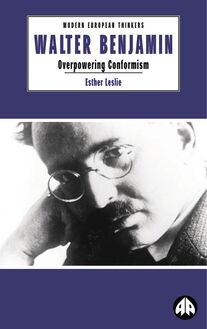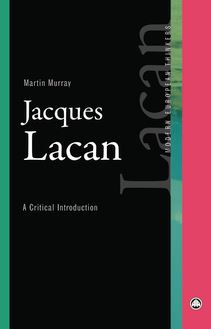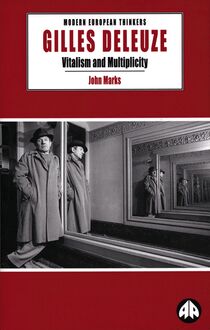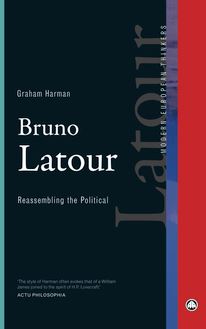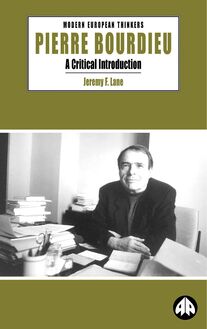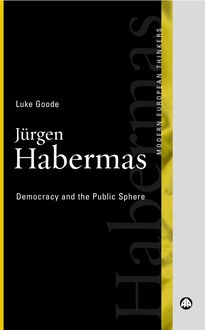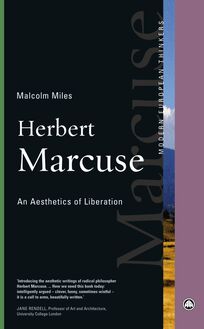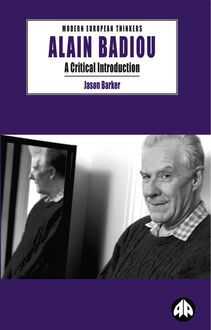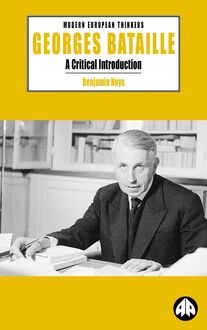Georges Bataille , livre ebook
123
pages
English
Ebooks
2000
Vous pourrez modifier la taille du texte de cet ouvrage
Obtenez un accès à la bibliothèque pour le consulter en ligne En savoir plus
Découvre YouScribe en t'inscrivant gratuitement
Découvre YouScribe en t'inscrivant gratuitement
123
pages
English
Ebooks
2000
Vous pourrez modifier la taille du texte de cet ouvrage
Obtenez un accès à la bibliothèque pour le consulter en ligne En savoir plus
Publié par
Date de parution
20 mai 2000
Nombre de lectures
2
EAN13
9781783718368
Langue
English
Treating Bataille's work as a whole rather than focusing, as other studies have done, on aspects of his work (i.e. as social theory or philosophy), Noys' study is intended to be sensitive to the needs of students new to Bataille's work while at the same time drawing on the latest research on Bataille to offer new interpretations of Bataille's oeuvre for more experienced readers. This is the first clear, introductory reading of Bataille in English - challenging current reductive readings, and stressing the range of disciplines affected by Bataille's work, at a time when interest in Bataille is growing.
Abbreviations
Introduction
1. The Subversive Image
2. Inner Experience
3. Sovereignty
4. The Tears of Eros
5. The Accursed Share
Conclusion
Notes and References
Bibiliography
Index
Publié par
Date de parution
20 mai 2000
Nombre de lectures
2
EAN13
9781783718368
Langue
English
Georges Bataille
Modern European Thinkers
Series Editors: Anne Beech and David Castle
Over the past few decades, Anglo-American social science and humanities have experienced an unprecedented interrogation, revision, and strengthening of their methodologies and theoretical underpinnings through the influence of highly innovative scholarship from continental Europe. In the fields of philosophy, post-structuralism, psychoanalysis, critical theory, and beyond, the works of a succession of pioneering writers have had revolutionary effects on Anglo-American academia. However, much of this work is extremely challenging, and some is hard or impossible to obtain in English translation. This series provides clear and concise introductions to the ideas and work of key European thinkers.
As well as being comprehensive, accessible introductory texts, the titles in the ‘Modern European Thinkers’ series retain Pluto’s characteristic radical political slant, and critically evaluate leading theorists in terms of their contribution to genuinely radical and progressive intellectual endeavor. And while the series does explore the leading lights, it also looks beyond the big names that have dominated theoretical debates to highlight the contribution of extremely important but less wellknown figures.
Also available
Alain Badiou
André Gorz
Jason Barker
Conrad Lodziak and Jeremy Tatman
Georges Bataille
Jürgen Habermas
Benjamin Noys
Luke Goode
Jean Baudrillard
Guy Hocquenghem
Mike Gane
Bill Marshall
Walter Benjamin
Julia Kristeva
Esther Leslie
Anne-Marie Smith
Pierre Bourdieu
Slavoj Žižek
Jeremy F. Lane
Ian Parker
Gilles Deleuze
John Marks
Georges Bataille
A Critical Introduction
Benjamin Noys
First published 2000 by Pluto Press 345 Archway Road, London N6 5AA
Copyright © Benjamin Noys 2000
The right of Benjamin Noys to be identified as the author of this work has been asserted by him in accordance with the Copyright, Designs and Patents Act 1988.
British Library Cataloguing in Publication Data A catalogue record for this book is available from the British Library
ISBN 978 0 7453 1592 8 hbk ISBN 978 0 7453 1587 4 pbk ISBN 978 1 8496 4533 1 pdf ISBN 978 1 7837 1837 5 Kindle ISBN 978 1 7837 1836 8 ePub
Library of Congress Cataloging in Publication Data Noys, Benjamin, 1969–
Georges Bataille : a critical introduction / Benjamin Noys.
p. cm. — (Modern European thinkers)
Includes bibliographical references.
ISBN 978-0–7453–1592–8
1. Bataille, Georges, 1897–1962—Criticism and interpretation.
I. Title. II. Series.
PQ2603.A695 Z795 2000
848'.91209—dc21
00–024889
Designed and produced for Pluto Press by Chase Production Services, Chadlington, OX7 3LN Typeset from disk by Stanford DTP Services, Northampton Printed on Demand in the European Union by CPI Antony Rowe, Eastbourne, UK
Contents
Abbreviations
Introduction
1. The Subversive Image
2. Inner Experience
3. Sovereignty
4. The Tears of Eros
5. The Accursed Share
Conclusion
Notes and References
Bibiliography
Index
Acknowledgements
I would like to thank Geoffrey Bennington for his patient supervision of the DPhil from which this book has developed and for his continuing encouragement of my work. I would also like to thank the British Academy for the three-year award which made that DPhil possible and the staff of the Graduate Research Centre in the Humanities at the University of Sussex for their help. I want to thank all the staff at Pluto Press for their belief and support for this book, particularly Keith Reader and Anne Beech. I am grateful to James Tink and Ben Rumble for reading drafts of this work and their feedback, to Matt Fletcher for all his help, and to my family, Diane, Charles, Alison and Danny. Above all I would like to thank Jane Gillett, to whom this book is dedicated and without whom it would have been impossible.
Abbreviations
Refer to the major works by Bataille and to The Critical Reader .
Accursed Share Vol. 1 (AS1)
Accursed Share Vols 2 and 3 (AS2/3)
The Bataille Reader (BR)
Bataille: A Critical Reader (CR)
The College of Sociology (CS)
Eroticism (E)
Encyclopaedia Acephalica (EA)
Guilty (G)
The Impossible (I)
Inner Experience (IE)
L’Abbé C . (AC)
Literature and Evil (LE)
On Nietzsche (ON)
Story of the Eye (SE)
The Tears of Eros (TE)
Theory of Religion (TR)
The Trial of Gilles de Rais (TG)
Visions of Excess (VE)
Introduction
All profound life is heavy with the impossible .
Georges Bataille (IE, 58; BR, 88)
Georges Bataille (1897–1962) is still probably best known as a writer of erotic fiction and as a precursor of poststructuralism, but what do we really know about Bataille? During his lifetime he was a somewhat obscure figure, not widely read but closely supported by a few important friends: Michel Leiris, Maurice Blanchot, Jacques Lacan and Pierre Klossowski, among others. He lived a contradictory life, both the calm life of the professional librarian and the dissolute life of a libertine. After his death he began to gain popularity and the readers that he had so desired, but he still remained obscure. Now Bataille has an ambiguous fame as the writer of excess; disturbing, shocking, perhaps even mad. In an age that so admires excess Bataille has become more and more accepted, even lauded as the prophet of transgression. 1 The literary works that he published under pseudonyms in order to avoid prosecution for obscenity are now ‘modern classics’ that have been assimilated into the Western canon, 2 and the intensity of his other unclassifiable writings are reduced to interesting footnotes to the intellectual history of poststructuralism. 3
The problem with this assimilation and appropriation of Bataille is that it is a profound failure to read Bataille. As we will see Bataille did not seek admirers and he regarded apologists for his work with suspicion. The promotion of Bataille as a counterculture icon cannot accept that he is still, as his friend Michel Leiris described him, ‘the impossible one’ (in CR, 167). Bataille recognised early in his intellectual career that he would remain isolated but, ‘This isolation, as far as I am concerned, is moreover in part voluntary, since I would agree to come out of it only on certain hard-to-meet conditions’ (VE, 91; BR, 147). Although Bataille has become more popular since his death he has not left this state of isolation because most readers of Bataille have not confronted the hard-to-meet conditions that he imposes. To draw him out of it, to introduce Bataille, requires that we try to understand these conditions.
Firstly, it will be a matter of finding out what hard-to-meet conditions Bataille imposes on us, his readers. Once this has been 1 done it will then be possible to approach the relation between Bataille’s life and work, after we have seen how Bataille demands to be read. For Bataille the life and work of a writer could not be held apart, and his own writings demonstrate how events in his life constantly impinge on his work and open it to new forces. It is these openings between Bataille’s life and work that will lead to the readings of Bataille in the chapters that follow. Finally, in this introduction I want to consider how Bataille leads us into ‘the labyrinth of thought’ (AS2/3, 370). The labyrinth is Bataille’s image of thought, and it is a labyrinth from which we cannot escape. By leading us into the labyrinth Bataille demonstrates why it is impossible to appropriate his work and why he still remains a vital figure in modern European thought.
The hard-to-meet conditions that Bataille imposes on us are made most explicit in ‘The Use-Value of D.A.F. de Sade (An Open Letter to My Current Comrades)’, which was probably written between 1929 and 1930 but was unpublished at the time. Even here the conditions are not set out directly but through the question of how we should read the scandalous and pornographic writings of the Marquis de Sade. Bataille identified with Sade (1740–1814), the aristocratic libertine who supported the French revolution. Sade was both imprisoned in the Bastille by the ancien régime and in a lunatic asylum after the revolution, as his works were disturbing to monarchists and to republicans alike. 4 Bataille is concerned with the nature of the scandal of Sade’s works and how they can still remain a scandal for us. Moreover, on many points Bataille’s ‘physics and metaphysics are not essentially different from those of the Marquis de Sade’. 5 It is not surprising then that Bataille should link his own fate to that of Sade.
So, although Bataille’s essay is ostensibly about Sade, and in particular ‘the brilliance and suffocation that the Marquis de Sade tried so indecently to provoke’ (VE, 93; BR, 149), it is also a reflection on the same effects in Bataille. When Bataille writes about Sade he is never writing only about Sade but also about himself. He is concerned with two dominant reactions to Sade: the violent rejection of Sade’s works and the admiration of Sade’s works. The first reaction is probably more prevalent and more familiar, so familiar that Simone de Beauvoir could write an article entitled ‘Must we Burn Sade?’ in 1951. 6 However, Sade has also had his admirers and this was particularly true of when Bataille was writing. The surrealists had rediscovered Sade, along with Lautréamont, as a proto-surrealist. For Bataille it was Sade’s ‘most open apologists’ (VE, 92; BR, 148) which concerned him more because, as he commented in his later work Eroticism (1957), ‘Those people who used to rate de Sade as a scoundrel responded better to his intentions than his admirers do in our own day: de Sade provokes indignation and protest, otherwise the paradox of pleasure would be nothing but a poetic fancy’ (E, 180).
Those who reject Sade respond better to his intentions than his admirers do, because his admirers find, or make, Sade acceptable. They turn the paradox of pleas
